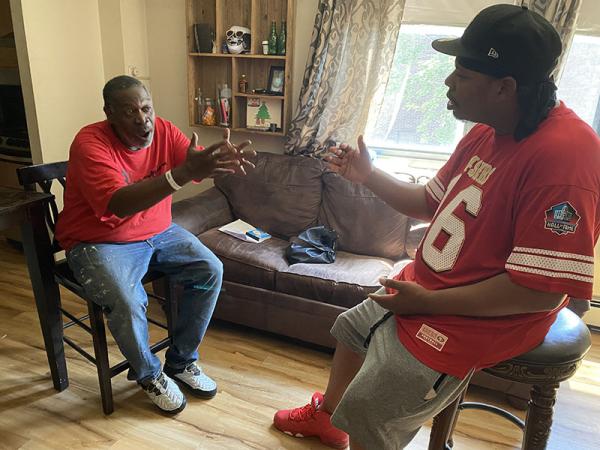The Power of Storytelling for Public Health Outreach and Research
When Mike McClure Jr. speaks, people listen. As pastor at Rock City Church in Birmingham, Alabama, he has the ear of the thousands of members who call the congregation home.
When the Alabama CEAL team’s Tiffany Osborne, director of community engagement, suggested he record a video about why he got vaccinated, McClure saw the value in speaking up and sharing his story. He could explain why he and his family got vaccinated—and ask others to consider it.
In communities hardest hit by COVID-19 and underrepresented in research, multiple approaches to storytelling are helping CEAL teams connect with residents, understand health inequities, and enhance vaccine confidence and trust in science.
Uplifting Community Voices
McClure’s story is part of the Alabama CEAL team’s Voices to Vaccinate program. Launched at the beginning of 2022, the program has collected 65 stories from trusted messengers across Alabama.
The team created “GoPacks” that had equipment to record stories at community events and instructions for uploading stories to the website. Osborne worked with friends, neighbors, pastors, the Alabama Conference of Black Mayors, Alabama chapters of the NAACP, and Divine Nine Black sororities and fraternities to recruit Alabamans to record their stories.
In his video, McClure explains he wanted his kids to get back to school and their friends. He told the story about again being able to hug his mother, who has diabetes. He wanted his church to get back to in-person services. “I believe this is what’s necessary for us to go forward in this new normal.” In addition to recording the video, Pastor McClure opened up his church as a vaccination site for the community.
Stories of Health Care Workers and Community Members
The New Mexico CEAL project, Wide Engagement for Assessing COVID-19 Vaccine Equity (WEAVE NM), uses storytelling as an approach to promote racial equity and health. In short, digital videos, diverse community members share how the pandemic has affected them and their loved ones.
“The goal is to learn the systematic, social, and cultural factors that have led to the inequities we see in COVID-19 vaccination and clinical trial participation by listening to the people who are living these disparities firsthand,” says Lisa Cacari-Stone, Ph.D., lead principal investigator.
The New Mexico project is also using a research method called Catalyst Films to capture the voices and narratives of health care workers. The team filmed a total of 14 interviews at two clinics that have long-standing, trusting relationships with their community, explained Nancy Pandhi, Ph.D., co-developer of the Catalyst films and key investigator with the New Mexico CEAL project. One clinic is in a Native American community and the other is on the southern border with Mexico.
In the interviews, health care workers spoke of the pandemic's personal and professional impact. They described shifting how they provided care to meet needs for testing, vaccination, and overall health care. They also spoke of resilience, hope, and lessons learned for the future. From these interviews, Pandhi and her team will create films to highlight themes and lessons and inspire community dialogue.
Finding Qualitative Data in Stories
The Massachusetts CEAL team explored the origins of medical distrust by analyzing the stories of community members and health care professionals talking in small groups about their health care experiences.
The team will develop a curriculum for medical students and health care workers using their data, combined with content from interviews with community members, said Katherine Gergen Barnett, M.D., a primary care physician at Boston Medical Center and Massachusetts CEAL co-investigator.
“On a physiological basis, a story has the power to bypass our frontal lobe (executive brain) and go right to our amygdala, the part of our brain that is responsible for memory, decision making, and emotional reactions, where we’re much more driven to change,” Gergen Barnett explains.
“Stories capture the complexity of a given problem, conveying the richness of a person,” says Cara Solomon, executive director of Everyday Boston, a nonprofit organization that collaborated with the Massachusetts CEAL team. “Stories have the power to shift the way we see the world, to modify our behavior, change policy, and lead to systems-level change in a way that statements and statistics can’t always do.”

The Massachusetts CEAL team is using stories captured from one-on-one interviews with community members to develop a curriculum to teach medical students and health care professionals about health disparities in communities hardest hit by COVID-19.
Last updated: January 6, 2024